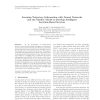Free Online Productivity Tools
i2Speak
i2Symbol
i2OCR
iTex2Img
iWeb2Print
iWeb2Shot
i2Type
iPdf2Split
iPdf2Merge
i2Bopomofo
i2Arabic
i2Style
i2Image
i2PDF
iLatex2Rtf
Sci2ools
JIKM
2006
2006
Learning Trajectory Information with Neural Networks and the Markov Model to Develop Intelligent Location-Based Services
In the development of location-based services, various location-sensing techniques and experimental/commercial services have been used. However, conventional location-based services are limited in terms of flexibility because they depend on the current location of the user. We propose a novel method of predicting the user's future movements in order to develop advanced location-based services. The user's movement trajectory is modelled using a combination of recurrent self-organising maps (RSOM) and the Markov model. Future movement is predicted based on past movement trajectories. A prototype application based on location prediction is also presented. This application is a mobile user assistant targeted to university students. To verify the proposed method, a GPS dataset was collected on the Yonsei University campus. The results were promising enough to confirm that the application works flexibly even in ambiguous situations.
| Added | 13 Dec 2010 |
| Updated | 13 Dec 2010 |
| Type | Journal |
| Year | 2006 |
| Where | JIKM |
| Authors | Sang-Jun Han, Sung-Bae Cho |
Comments (0)

